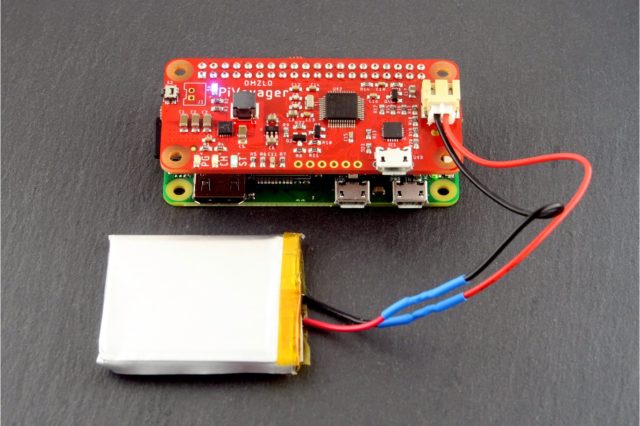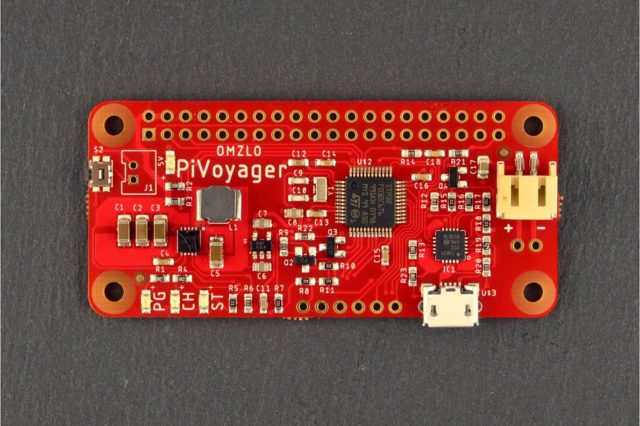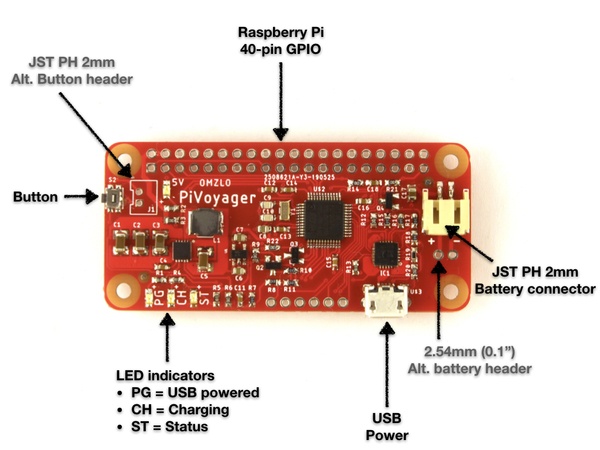The Raspberry Pi is a powerful SBC (Single Board Computer), and aside from being used for everyday computing stuff, the Raspberry Pi can be embedded as the brain of various projects. Using the Raspberry Pi for standalone projects do create some concerns about power. How do I power the Pi? Should I get a power bank? Or maybe I need a longer wired connector.

If powering your Raspberry Pi based project has always being a concern to you, then you don’t have to worry about it again with the introduction of the PiVoyager. The PiVoyager is an uninterruptible power supply (UPS) for the Raspberry Pi specially designed to work with standard Li-Ion or LiPo batteries.
It is shaped in the form a Pi Zero HaT making it fully compatible with PiZero form factor, but nevertheless, it will still work with any Raspberry-PI having the conventional 40-pin header found in the Pi 2,3, B+, and 4.
The PiVoyager was made by Omzlo, the team behind the NoCAN IoT Platform. The UPS Hat goes a step above standard UPS device; it comes with a programmable watchdog, wake-up and a real-time calendar clock that can be used with the Raspberry

The PiVoyager is not the only UPS HaT designed for the Raspberry Pi. PiJuice Zero is a similar UPS device with a slightly hefty price, LiFePO4wered/Pi+ is another one that relies on LiFeP04 (Lithium Iron Phosphate) battery which is said to be safer and longer-lasting albeit at the cost of lower capacity, and some others as well.
The PiVoyager can power the Pi and charge a Li-Ion/LiPo battery simultaneously. When the HaT is plugged to a USB power course, it charges and powers the Pi. It supports a charge current of 1A (default) or 0.5A for the battery. With the USB power removed, it can provide up to 2.1A max at 5V to the Raspberry Pi automatically without switching the Pi off.
The RTC (Real-Time Calendar) on the PiVoyager can store the current date and time. Some of the possibilities with the PiVoyager are:
- Monitor power status and battery voltage.
- Force the Raspberry Pi to shut down after a specified delay entirely.
- Act as a watchdog, powering down the Raspberry Pi if it becomes inactive.
- Power up the Raspberry Pi at a specific date/time (alarm).
- Power up the Raspberry Pi after a certain delay.
- Update the firmware through I2C thanks to a built-in bootloader.

A battery protection circuity isn’t built into the PiVoyager, so if you mistakenly misconnect the terminals of your battery to the HaT, things could go wrong. There is battery connector, and an alternative 2.54mm 2-pin header is also provided for battery connection.
The PiVoyager is available for purchase on Tindie for $27.95 without VAT and shipping. With VAT, the price could go up to $34.66. The PiVoyager is targeted at batteries with a nominal voltage of 3.7V, a charging voltage of 4.2V and supporting a charge current of 1000mA
More information about the product is available on the product page as well. Also, the hardware design is open-source and available at GitHub, and the software firmware is available here.

I enjoy writing about the latest news in the areas of embedded systems with a special focus on AI on edge, fog computing, and IoT. When not writing, I am working on some cool embedded projects or data science projects. Got a tip, freebies, launch, idea, gig, bear, hackathon (I love those), or leak? Contact me.
Support CNX Software! Donate via cryptocurrencies, become a Patron on Patreon, or purchase goods on Amazon or Aliexpress





Looks good but some strange with layout. For example VCC_2. Also other signals not efficient. Possible make better.
The PiVoyager is open-source hardware. If you do better, please share your work with the community. I’m sure Omzlo will be happy to incorporate your enhancements in their next release.
Will post this again; if you want a cheap UPS solution, this is the way to go.
https://www.ebay.com/itm/DC-DC-5V-2-1A-Output-UPS-Mobile-Power-Step-up-Module-Board-Charger-Converter/223264325448?hash=item33fb973f48:g:XyEAAOSw0vJcAQo~
It doesn’t have RTC, but other than that, it works just like the board above.
“This module without lithium battery over-discharge protection”
I wouldn’t want to be anywhere near this when the device breaks due to a voltage spike or something.
You should always use overvoltage/undervoltage protection on each cell itself and not rely on the charging circuits to do that.
Other than bare 18650 cells, most cells feature that kind of protection anyway.
>I wouldn’t want to be anywhere near this when the device breaks due to a voltage spike or something.
Over-discharge will result in the cell puffing up not it exploding. If your input power supply has very bad regulation there isn’t much any charger can do for you. Even with input protection if the voltage spikes are big enough all bets are off.
Does it have brownout detection/protection?
>It doesn’t have RTC, but other than that, it works just like the board above. Not saying this thing is any good but what you linked isn’t really “just like the board above”. They both have a charger and step up the output voltage but this pivoyager thing should allow for the pi to be totally powered off and woken up via it’s RTC and so forth. FYI the common charger/stepup modules on ebay aren’t really good for stuff like this as the step up is connected to the battery directly so they generally don’t work very well when you… Read more »